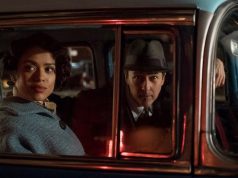Noah Baumbach is well acquainted with the darkness of fractured families, and he finds it funny. His autobiographical “Squid and the Whale” earned praise for its unflinching look at an upscale family in crisis, while his screenplay for Wes Anderson’s “Life Aquatic with Steve Zissou,” though lighter in tone, was also awash in daddy issues.
Now we come to “Margot at the Wedding,” where the parents are gone altogether, and where the tone is dark not just in subject matter but in cinematography. (Seriously, some scenes look like the camera had glaucoma.) It is the rare film where a reference to a girl having been “raped by the horse trainer” can be played for laughs — and get them.
Dysfunction is on the menu again, this time involving sisters. Pauline (Jennifer Jason Leigh, Baumbach’s wife) is getting married to Malcolm (Jack Black), a depressed hipster artist and musician with a mustache that he says he’s wearing for ironic purposes. (“It’s meant to be funny.”) Are they a good match? Eh, as good as anyone else is.
Pauline’s sister Margot (Nicole Kidman) is coming to the wedding, which will be held in the backyard of the house the girls grew up in. On the train ride up, Margot tells her early-adolescent son Claude (Zane Pais) all about Aunt Pauline, but she’s really telling us about herself. Margot is bossy, competitive, and meddling, with a persecution complex and a tendency to blame everyone else for her problems. She is also a writer, and the danger of knowing or being related to her is that you’re bound to wind up having your dirty laundry aired in one of her stories.
The film’s story line is simple enough — Margot arrives; conflict bubbles up — but the emotions and characters are complex indeed. Like many real-life siblings, Margot and Pauline can argue one minute and laugh at a shared joke the next. Their relationship can’t be summarized as “they hate each other” or “they’re at odds with one another,” but rather “they’re sisters.”
Her strangled American accent notwithstanding, Kidman’s performance is cool and crisp, a rather engaging portrait of a multi-faceted woman, albeit one whose aloofness (or is it just Kidman’s?) prevents us from completely understanding her. Jennifer Jason Leigh is characteristically natural and unaffected (why doesn’t she make more films?), and even Jack Black — not known for his dramatic range — is less Jack Black-y than usual.
The film’s major problem is that the three central figures are whiny narcissists. Baumbach has a knack for writing and directing honest, believable characters, and that’s laudable. But just because a character is realistic doesn’t mean he or she is worth spending 90 minutes with, especially when seemingly every other independent film released in the last five years has mined much of the same territory. There are laughs here, including a lot where you cringe at the same time, and a fair amount of insight. I just wish Baumbach had something new to bring to the table. Like his pal Wes Anderson, he keeps serving the same thing, and it’s getting old.
B- (1 hr., 33 min.; )





